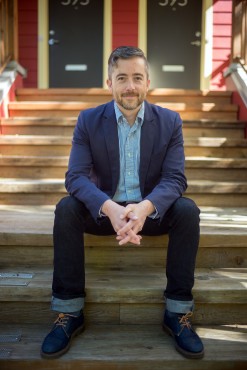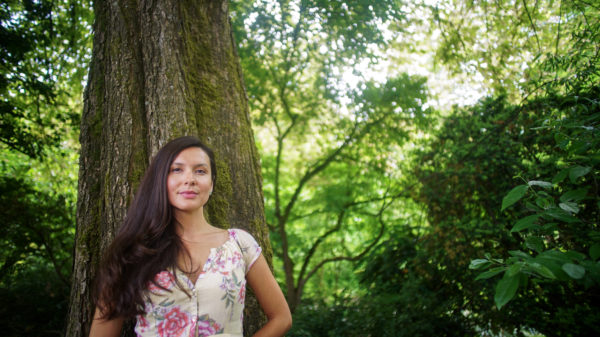In the global fight against climate change, two UVic alumni are demonstrating the complexity of climate issues and the value of approaching such challenges through an interdisciplinary lens. Those alumni, Melina Laboucan-Massimo and Brett Dolter, are two of the three inaugural recipients of the David Suzuki Fellowship who will spend the next year under the tutelage of scientific experts at the David Suzuki Foundation.
Based in Vancouver, the fellowship grants distinguished researchers $50 000 in addition to invaluable mentorship and professional development. The goals of the fellowship are two-fold: to support scientific and research excellence and to inspire the community to take action.
Over the next three years, the fellowship will provide recipients with the space and support required to conduct solutions-oriented research and engage with the public. Fellows will split their time equally between completing their one-year research projects and engaging in professional development with experts from the foundation. While the former may seem more immediately important, the foundation aims to foster great minds who are leaders in public discourse about protecting the planet. As such, their research must be accessible if it is to be understood and acted upon by the public.
Complex by nature, though accessible by necessity, Dolter’s research looks at climate change from an economic perspective.
“The overarching theme of my fellowship research is transitioning our economy and society to a zero emissions future, using technologies like renewable energy,” Dolter writes in an email to the Martlet.
“Simply put, economics is the study of how to allocate scarce resources. It’s important that we test our ideas through an economic lens to ensure we get the ‘biggest bang for our buck,’ and it’s also important not to overstate the importance of economics.
“We live in a democracy and it is our responsibility as citizens to decide our collective future,” he adds. “Economics helps make us aware of the cost of our choices and the tradeoffs we face. While this information can be used as an input into the democratic process, it should not be seen as prescriptive of the ‘socially optimal’ or best course of action. It is for citizens — through their elected representatives — to decide our preferred future. Deliberative economic modelling can be a tool to inform those choices.”

Brett Dolter is one of the recipients of the David Suzuki Fellowship. Photo provided by the David Suzuki Foundation
During his fellowship, Dolter’s research will build on his PhD dissertation where he used an economic model to understand pathways for “greening” the Saskatchewan grid and lessening greenhouse gas (GHG) emissions.
“This approach involves bringing people with diverse perspectives together to help develop, test and use an interactive economic model,” he explains. “The initial goal was to develop realistic scenarios for lowering GHG emissions in the Saskatchewan electricity sector, and generate shared understanding of the trade-offs we face when lowering GHGs.”
“I plan to run further deliberative modelling sessions during my fellowship, to continue to explore how deliberation can help build consensus and commitment to action.”
Having grown up in the heart of the tar sands, Laboucan-Massimo’s fellowship research will hit close to home. An alumna of UVic’s Master’s in Indigenous Governance program, she is the recipient of the Indigenous Knowledge and Climate Change Fellowship.
Laboucan-Massimo has worked in climate and energy for the past decade — following a career in social justice — and her research will focus on renewable energy models in Indigenous communities, advocating for more progressive renewable energy policy, and the implementation of renewable energy projects in Indigenous communities across Canada.
This undertaking is an extension of her Master’s thesis — the completion of a 20.8-kilowatt solar installation in her home community of Little Buffalo in Northern Alberta.
In order to understand what good energy models look like, Laboucan-Massimo says we must look beyond the purely scientific to cultural understandings and holistic approaches.
“We really need to look at how we reduce greenhouse gas emissions,” she says, “and how we do that through building new types of energy systems that are less destructive and more regenerative so our communities can live in very healthy ways.
“We need to have holistic approaches to deal with such a huge global issue as climate change. And if we don’t, then we’re just going to recreate the systems that have already created this crisis that we find ourselves in.”

Melina Laboucan-Massimo, another UVic alumni who will continue working against climate change during her fellowship. Photo provided by the David Suzuki Foundation
Laboucan-Massimo also warns against rampant consumerism which she believes has contributed to an imbalance with the environment.
“We aren’t really taking into full account how our lifestyles and our excessive consumerism — which is created through capitalism — is just a take, take, take form” she says.
“In Western society, we separate ourselves from the environment [and] from the land . . . and I think that’s why we see the land and the climate out of balance at this point in time. From an Indigenous perspective, Indigenous peoples see themselves as part of the land, as part of the ecosystem — not separate, not in hierarchy — we are a part of the land.
“That’s a lot of the reason why I’ve been working on climate and energy issues for the past decade: I was raised with the perspective that we need to respect the land, we need to have reciprocity with the land — so not taking more than we need — and respecting the land.”
As such, it only makes sense that Laboucan-Massimo’s research will combine renewable energy and a respectful and holistic view of our planet.
“It’s really exciting to move forward and be supported by the David Suzuki Foundation because I really think that their values are in line with the types of values that I have,” she says. “I’m really happy that they want to support this type of research and this work within Indigenous communities.”







